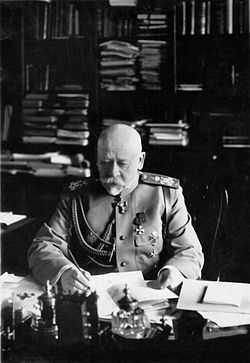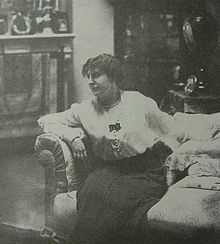Vladimir Sukhomlinov

Vladimir Aleksandrovich Sukhomlinov (Russian: Владимир Александрович Сухомлинов) (August 16 [O.S. August 4] 1848, Telšiai – February 2, 1926, Berlin) was a cavalry general of the Imperial Russian Army (1906) who served as the Chief of the General Staff in 1908–09 and the Minister of War until 1915, when he was ousted from office amid allegations of failure to provide necessary armaments and munitions.
Biography
Vladimir Sukhomlinov graduated from Nikolayevskoye Cavalry School (1867). He served in the Uhlans of the Imperial Guard Regiment based at Warsaw. He graduated from the General Staff Academy in 1874. He participated in the Russo-Turkish War of 1877-1878, served for some time on the staff of General Mikhail Skobelev, and was awarded the Order of St. George 4th class.
After the war, on the invitation of General Mikhail Dragomirov, Chief of the General Staff Academy, he joined the staff of that institution, and lectured as well at the Nicholas Cavalry School, the Corps of Pages and the Mikhail Artillery School.
From 1884 to 1886, Sukhomlinov commanded the 6th Dragoon Regiment at Suvalki. He was Chief of the Officers' Cavalry School at St. Petersburg from 1886 till 1898, being promoted General in 1890. His next appointment was as Commander of the 10th Cavalry Division at Kharkov. In 1899, Sukhomlinov was appointed Chief of Staff of the Kiev Military District. In 1902, he became a deputy commander and, in 1904, commander of the Kiev Military District. In 1905, Vladimir Sukhomlinov was appointed Governor General of Kiev, Podolia, and Volhynia.
Minister of War

In December 1908, he became head of General Staff and, in March 1909, Minister of War. In this position he opposed training innovations that would have placed emphasis on infantry firepower against the use of sabers, lances and bayonets; stating that "I have not read a military manual for the last twenty-five years". Sukhomlinov's personal charm and popularity with Tsar Nicholas II enabled him to survive charges of lazy incompetence and dishonesty while in office.[1] Maurice Paleologue, last French ambassador to Imperial Russia, described Sukhomlinov as "intelligent, clever and cunning, obsequious towards the tsar and a friend of Rasputin - a man who has lost the habit of work - I know few men who inspire more distrust at first sight". [2] Some regard Vladimir Sukhomlinov as responsible for the military stagnation of 1905–1912, which resulted in the unpreparedness of the Russian Army at the outbreak of World War I. On the other hand, in Bayonets Before Bullets, Bruce W. Menning asserts that "There was no doubt that he remained committed to building Russia's defensive and offensive military power.... Thanks to Sukhomlinov's reforms, the peacetime strength of the Imperial Russian Army on the eve of World War I reached 1,423,000 officers and men." Though he has some criticism for the Minister, Menning credits him with simplifying and modernizing the structure of the Russian army corps, including the addition of a six aircraft detachment to each.
Norman Stone maintains that Sukhomlinov had "an extremely bad press" due to his autocratic style and accusations of corruption made by his enemies in the Imperial Duma and the army. The effect of the allegations against him is that "Sukhomlinov, as a sort of uniformed Rasputin, belongs to the demonology of 1917. But the case against him is far from watertight." Stone details his position as the leader of an informal group of "praetorians" in the high ranks of the army: professional soldiers, often from lower- and middle-class backgrounds, with experience in and loyalty to the infantry. As such, Sukhomlinov and his allies were opposed by what Stone calls the "patrician" faction, upper-class officers owing less of their status to military service, who tended to favor the cavalry and artillery (especially fortress artillery). Stone regards the continued standoff between the two factions as the responsibility of the Czar Nicholas, who played the two sides off against one another as a means of preserving his own freedom of action. In any case, Sukhomlinov did try, with some success, to direct resources away from the static fortifications which would prove less useful in the coming war, to the infantry and mobile artillery. Stone blames Sukhomlinov's failure to achieve more on problems of Russian development economics, and the resistance of the supposedly "technocratic" patrician faction.
As Minister of War, Sukhomlinov was never trusted by the Army Committee of the Duma, led by Alexander Guchkov and it came to a duel. Sukhomlinov was resented by Grand Duke Nicholas Nikolaevich of Russia (1856–1929), Commander-in-chief of the Russian forces in the first phase of World War I. Disagreement between the Minister and his assistant, General Alexei Polivanov, culminated in 1912 in the dismissal of Polivanov, and his replacement by General Vernander.
Despite Sukhomlinov's reforms (or perhaps because of his inefficacy and resistance to change, as some assert), the opening phase of the First World War went badly for Russia. After several Russian defeats during the first months of war, Vladimir Sukhomlinov was relieved of his post. On 11 June Sukhomlinov was forced out of office.[3] He was succeeded by Alexei Polivanov.
Imprisonment and death

In March 1916, he was finally accused on charges of abuse of power and treason, after some of his close associates had been convicted for espionage on behalf of Germany (S. Myasoedov, A. Altschuller, V. Dumbadze, and others; Myasoedov, having an affair with the wife of Sukhumlinov, was trialed and hanged within one day). For the first time in Russian jurisprudence history, a public jury was taking part in a political trial. The wife of Sukhomlinov was accused of having very extravagant tastes.[5] In April he was taken to the Peter and Paul fortress, but in July he was transferred to a hospital. Responsibility for his being brought to trial was shared by Duke Mikhail Andronnikov, Alexander Khvostov and Alexander Alexandrovich Makarov.
According to Mikhail Rodzianko, Sukhomlinov's wife had sought assistance from Grigori Rasputin and Peter Badmayev. After Rasputin had spoken to the Empress, she defended Sukhomlinov until she (and Alexander Protopopov) had him freed after six months. On 26 October Sukhomlinov was placed under house arrest. When Protopopov visited the former minister at his apartment he was heavily criticized in the Duma.[6] It disgusted the public and injured the reputation of the government. The Myasoedov/Sukhomlinov cases may have done more harm to the monarchy than the lurid scandals associated with Rasputin.[7]
Sukhomlinov was again arrested after the February Revolution. His trial took place in August and September 1917. While acquitted of charges of treason, Sukhomlinov was found guilty of abuse of power and inactivity. He was sentenced to open-ended katorga on charges of leaving the army unprepared for the Great War.
Sukhomlinov was sent to a fortress to serve his sentence. On 1 May 1918, he was released from prison upon reaching 70 years of age. Soon, he emigrated to Finland and then to Germany. His memoirs appeared in 1924, dedicated to Wilhelm, the deposed German emperor. Highly critical of former colleagues, it was published in translation by the new Soviet Government. Sukhomlinov lived in extreme poverty in Berlin, where he was found frozen to death on a park bench[8] one morning in February 1926.[9]
Honours and awards
- Russian
- Order of St. Stanislaus, 3rd class (1875), 2nd class with swords (1878);
- Gold Sword for Bravery (1878);
- Order of St. George, 4th class (1878);
- Order of St. Vladimir, 4th class with swords and bow (1879) 3rd class (1883), 2nd class (1903);
- Order of St. Anna, 2nd class with swords (1879), 1st class (1896);
- Order of St. Stanislaus, 1st class (1893);
- Order of the White Eagle (1905);
- Order of St. Alexander Nevsky (1 January 1910)
- Diamond signs the Order of St. Alexander Nevsky (21 February 1913).
- Silver mark to commemorate the anniversary of the 1st Cadet Corps. (27 June 1907)
- Insignia of the Russian Red Cross. (30 September 1908)
- Medal in memory of the 100th anniversary of the 1812 War (August 15, 1912)
- Medal in memory of the 300th anniversary of the Romanov dynasty (21 February 1913)
- Medal for his work on other than implementation of a general mobilization in 1914 (24 March 1915)
- Medal to commemorate the 200th anniversary of the victory at Gangut (28 April 1915)
- Foreign
- Montenegrin campaign medal for 1877-1878 (1878)
- Romanian Iron Cross "for crossing the Danube." (1879)
- Order of St Alexander, 3rd class (1884, Bulgaria)
- Order of the Red Eagle, 2nd class (20 January 1890), 1st class (20 January 1905)
- Grand Cross of the Order of Franz Joseph (22 May 1891)
- Grand Cross of the Order of Leopold (Belgium) (30 January 1895)
- Order of the Lion and the Sun, 1st class with diamond signs (1903; Persia)
- Order of Military Merit (Bulgaria), 1st class (1903)
- Bukhara Order of the Iskander-Salis. (1909)
- Grand Cross of the Order of the Dannebrog (1909; Denmark)
- Grand Cross of the Order of St Alexander (1911, Bulgaria)
- Order of the Double Dragon, 1st class, third class. (1911; Chinese Empire)
- Order of the Rising Sun, 1st class (1911; Japan)
- Grand Cross of the Legion of Honour (1912; France)
- Order of the Red Eagle, Grand Cross. (1913; Prussia)
- Order of the Precious rod of the 1st century. (Mongolia, 1913)
- Albert Order, (1913; Saxony)
- Order of the Crown of Romania (1914)
Sources
- William C. Fuller, The Foe Within: Fantasies of Treason And the End of Imperial Russia, 2006. Ithaca, N.Y.: Cornell University Press.[10][11]
- Alfred Knox. General V. A. Sukhomlinov. The Slavonic Review, Vol. 5, No. 13 (Jun., 1926), pp. 148–152.
- Meiden, G.W. van der (1991) Raspoetin en de val van het Tsarenrijk.
- Bruce Menning, Bayonets Before Bullets: The Imperial Russian Army, 1861-1914, Bloomington: Indian University Press, 1992 (ISBN 0253213800).
- Norman Stone, The Eastern Front 1914-1917, New York: Charles Scribner's Sons, 1975 (ISBN 0140267255).
See also
- Kornelij Šacillo: Delo polkovnika Mjasoedova, in: Voprosy istorii (Moskau) 4/1967, S. 103-116.
- Viktor Gilensen: Germanskaja voennaja razvedka protiv Rossii (1871-1917), in: Novaja i novejšaja istorija (Moskau) 2/1991, S. 153-177.
References
- ↑ Barbara W. Tuchman (1964) "The Guns of August", p. 80-82. Four Square Edition
- ↑ Buttar, Prit. Collision of Empires. p. 52. ISBN 978 1 78200 648 0.
- ↑ O. Figes (1996) A People's Tragedy. The Russian Revolution 1891-1924, p. 268, 273.
- ↑ The Life of a Chemist: Memoirs of Vladimir N. Ipatieff
- ↑ http://www.warchron.com/sukhomlinovOnTrial.htm#WarMinisterSukhomlinovNo2
- ↑ R.C. Moe, p. 447-448.
- ↑ William C. Fuller (2006)The Foe Within: Fantasies of Treason and the End of Imperial Russia, p. 7.
- ↑ Fuller, William C. The Foe Within: Fantasies of Treason and the End of Imperial Russia. p. 256. ISBN 0801444268.
- ↑ MacMillan, Margaret. The War that Ended Peace. Random House, 2013. p. 642.
- ↑
- ↑ http://www.washingtontimes.com/news/2006/jul/29/20060729-104348-2847r/?page=all
External links
- Russia's war minister; the life and work of Adjutant-General Vladimir Alexandrovitsh Soukhomlinov (1915)
- Bio at FirstWorldWar.com.
 Nikolai Golovin (1922). "Sukhomlinov, Vladimir". Encyclopædia Britannica (12th ed.).
Nikolai Golovin (1922). "Sukhomlinov, Vladimir". Encyclopædia Britannica (12th ed.).
| Preceded by Nicholas Kleigels |
Governor-General of Southwestern Krai 1905–1908 |
Succeeded by Fyodor Trepov |
|